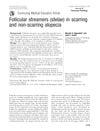 2 citations,
January 2015 in “Springer eBooks”
2 citations,
January 2015 in “Springer eBooks” Early diagnosis and aggressive treatment are crucial for Cicatricial Alopecia, and treatment effectiveness varies among patients.
 November 2022 in “The Indian journal of chest diseases & allied sciences”
November 2022 in “The Indian journal of chest diseases & allied sciences” Isoniazid can rarely cause hair loss, which is reversible after stopping the drug.
 February 2020 in “International Journal of Research in Dermatology”
February 2020 in “International Journal of Research in Dermatology” EPDS is a rare, chronic scalp condition that's hard to treat and needs better awareness for improved outcomes.
 87 citations,
December 2016 in “British journal of dermatology/British journal of dermatology, Supplement”
87 citations,
December 2016 in “British journal of dermatology/British journal of dermatology, Supplement” Cancer patients treated with immune checkpoint inhibitors may develop alopecia, but some hair regrowth is possible with treatment.
 63 citations,
May 2017 in “American Journal of Clinical Dermatology”
63 citations,
May 2017 in “American Journal of Clinical Dermatology” People with alopecia areata often have lower levels of vitamin D, zinc, and folate, but more research is needed to understand if supplements can help treat it.
 41 citations,
October 2011 in “Journal of Dermatology”
41 citations,
October 2011 in “Journal of Dermatology” Finasteride 1 mg effectively and safely increases hair growth in Japanese men with hair loss.
 29 citations,
July 2008 in “Journal of Cutaneous Pathology”
29 citations,
July 2008 in “Journal of Cutaneous Pathology” Hair root sheaths are more common in non-scarring hair loss and help diagnose the type of hair loss.
 23 citations,
January 2020 in “Central-European Journal of Immunology/Central European Journal of Immunology”
23 citations,
January 2020 in “Central-European Journal of Immunology/Central European Journal of Immunology” Alopecia areata, a type of hair loss, is likely an autoimmune disease with a genetic link, but its exact cause is still unknown.
 23 citations,
October 2018 in “Expert Opinion on Drug Safety”
23 citations,
October 2018 in “Expert Opinion on Drug Safety” Consider benefits and risks of new alopecia treatments for safety.
 15 citations,
May 1997 in “Annals of Internal Medicine”
15 citations,
May 1997 in “Annals of Internal Medicine” Tamoxifen caused hair loss in a 52-year-old woman.
 14 citations,
April 2006 in “Expert Review of Dermatology”
14 citations,
April 2006 in “Expert Review of Dermatology” Antiandrogen therapy helps treat genetic hair loss.
 5 citations,
January 2015 in “Journal of clinical & experimental dermatology research”
5 citations,
January 2015 in “Journal of clinical & experimental dermatology research” MorrF improves hair growth better than minoxidil alone.
 June 2023 in “Dermatology and therapy”
June 2023 in “Dermatology and therapy” Doctors in the Middle East need better treatments and more knowledge about new therapies for hair loss condition Alopecia Areata.
 89 citations,
October 1996 in “Dermatologic Clinics”
89 citations,
October 1996 in “Dermatologic Clinics” Alopecia areata is likely caused by a combination of genetic factors and immune system dysfunction, and may represent different diseases with various causes.
 81 citations,
July 2011 in “Lasers in Medical Science”
81 citations,
July 2011 in “Lasers in Medical Science” The Lexington LaserComb helped regrow hair in mice with a condition similar to human hair loss.
 48 citations,
February 2014 in “Fertility and Sterility”
48 citations,
February 2014 in “Fertility and Sterility” Women with PCOS often have hair loss, which is linked to acne or excess body hair but not to worse hormone or metabolic issues.
 45 citations,
December 2014 in “Journal of the European Academy of Dermatology and Venereology”
45 citations,
December 2014 in “Journal of the European Academy of Dermatology and Venereology” Plasmacytoid dendritic cells are a key factor in causing hair loss in alopecia areata and could help differentiate it from other hair loss conditions.
 11 citations,
January 1961 in “Archives of dermatology”
11 citations,
January 1961 in “Archives of dermatology” Corticosteroid injections helped eyebrow hair regrow in men with alopecia areata.
 3 citations,
July 2018 in “JAAPA”
3 citations,
July 2018 in “JAAPA” Some birth control pills can cause hair loss, and switching to ones with less androgen should help.
 2 citations,
March 2015 in “Expert opinion on orphan drugs”
2 citations,
March 2015 in “Expert opinion on orphan drugs” New treatments for hair loss show promise but need more research to confirm safety and effectiveness.
 January 2024 in “Frontiers in endocrinology”
January 2024 in “Frontiers in endocrinology” The study suggests that hypothyroidism may cause alopecia areata.
 March 2023 in “Clinical, cosmetic and investigational dermatology”
March 2023 in “Clinical, cosmetic and investigational dermatology” IL-33 is linked to hair follicle damage in psoriasis and could be a treatment target for hair loss in this condition.
 January 2008 in “Springer eBooks”
January 2008 in “Springer eBooks” Thyroid disease can cause hair loss and treating thyroid problems might help with hair disorders.
 182 citations,
December 2017 in “Journal of the American Academy of Dermatology”
182 citations,
December 2017 in “Journal of the American Academy of Dermatology” Some treatments can help with a hair loss condition called alopecia areata, but none ensure lasting results; choices depend on the person, with JAK inhibitors showing promise for severe cases.
 23 citations,
January 2009 in “Veterinary Dermatology”
23 citations,
January 2009 in “Veterinary Dermatology” The hepatitis B vaccine did not cause hair loss in the tested mice.
 17 citations,
June 2017 in “British Journal of Dermatology”
17 citations,
June 2017 in “British Journal of Dermatology” The article concludes that hair loss is a common side effect of drugs treating skin cancer by blocking the hedgehog pathway, but treatment should continue, and more selective drugs might prevent this side effect.
 8 citations,
October 2019 in “Immunological investigations”
8 citations,
October 2019 in “Immunological investigations” The AIRE gene variant rs2075876 is linked to a higher risk of alopecia areata in males.
 2 citations,
July 2012 in “InTech eBooks”
2 citations,
July 2012 in “InTech eBooks” People with alopecia areata often have thyroid autoimmunity.
 118 citations,
April 1998 in “Dermatologic Clinics”
118 citations,
April 1998 in “Dermatologic Clinics” Finasteride and minoxidil are effective for hair regrowth, while treatments for alopecia areata have varying success and continuous treatment is necessary.
 42 citations,
March 2006 in “Drug Discovery Today: Therapeutic Strategies”
42 citations,
March 2006 in “Drug Discovery Today: Therapeutic Strategies” The conclusion is that we need more effective hair loss treatments than the current ones, and these could include new drugs, gene and stem cell therapy, hormones, and scalp cooling, but they all need thorough safety testing.






























